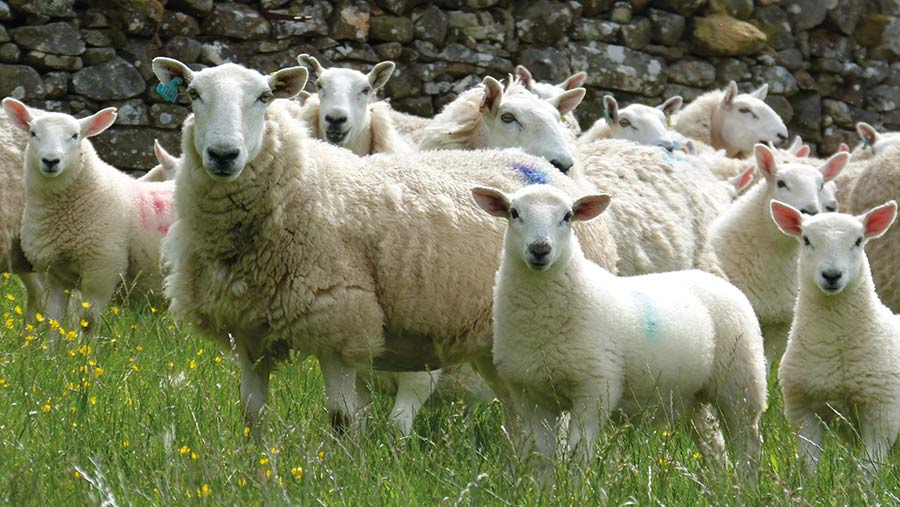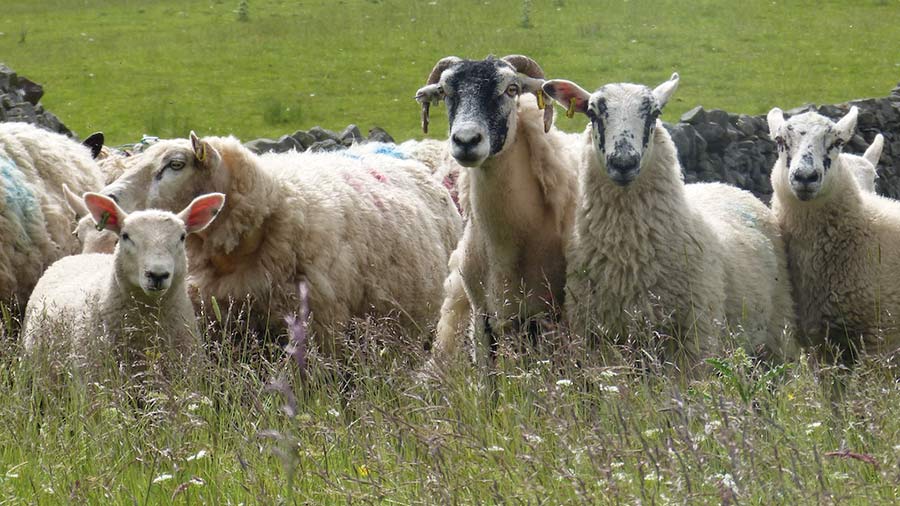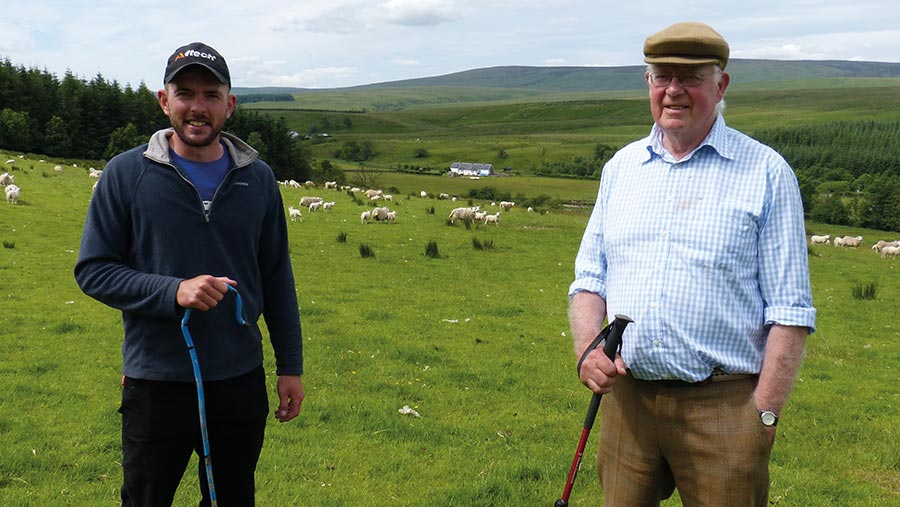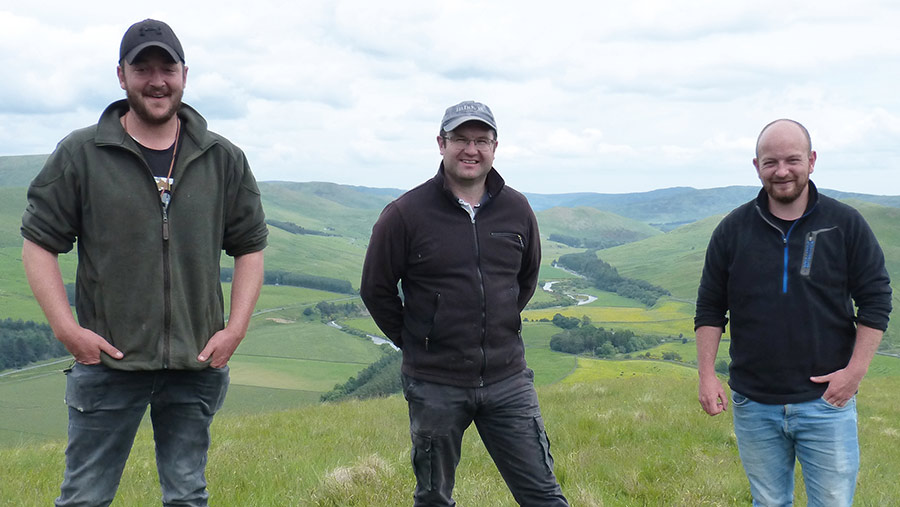Versatile sheep breed shakes up hill sector
 © MAG/Michael Priestley
© MAG/Michael Priestley Rising costs and diminishing subsidies have made many upland farms review output and systems.
Numerous units have switched to a Cheviot sire for this reason, either to breed replacements or as a terminal sire for store or prime lambs.
Society sales have seen throughputs and averages lift and the Cheviot Mule has seen an explosion in popularity.
See also: Performance recording helps lift lamb cheque by £9k/year
North and South Country Cheviots have a hill-and park-type strain, meaning the sheep can suit a variety of hill environments.
Farmers Weekly speaks to three breeders using Cheviots with a firm eye on the future.
Cheviot store lamb could save £9,200
Switching to Cheviot tups is part of a Dales farm plan to save £9,200 in winter costs by producing a more marketable store lamb for the autumn sales.
Paul Brown and family at Swale Hall, Reeth, currently sell about 500 of their 1,000 lambs as stores at Darlington Farmers Auction Mart (DFAM).

© MAG/Michael Priestley
Farm facts: Swale Hall, Reeth
- 200 Swaledales, 200 Mules, 300 Texel-crosses
- Sells 100-150 Mule gimmers annually
- Single lambs outside, multiple lambs housed
- 607ha (1,500 acre) rented heather moorland
- 60ha (150 acre) unimproved hill pasture and 60ha (150 acre) ploughable
- Reseeds 5-10ha (12-25 acres) annually
- Land height up to 555m
Previously focused on finishing most of their wether and reject gimmer lambs on hoppers in meadows, they used to carry 400 lambs into the winter for nine weeks on average.
However, the Cheviot-cross lambs are keenly sought after in August and September. Last year, the stores (mostly at 35kg) sold for £75-£108 a head.
The Browns have also been impressed by the breed’s vigour at lambing.
“If store price is £80, fat price would have to be £103 nine weeks later to break even when accounting for winter costs,” says Mr Brown.
He concedes that farmers growing root crops can feed them for a lot less, but that doesn’t suit the farm.
Rough cost of housing lambs in winter
- Hard feed £1.75 (£260/t) a lamb a week: £15.75 a lamb for nine weeks
- Wormed three times 60p a lamb
- Mineral dose £1 a lamb
- Plunge dip for scab 80p a lamb
- Vet and medicine 12p a lamb
- Labour and fuel £3 a lamb
- 2% mortality at £90 a lamb (including disposal) £1.83 a lamb
- Total housing cost £23 a lamb x 400 = £9,200
Historically, the farm bred pure Swaledales, selling draft ewes from a stratified system, but a Swaledale tup hasn’t been used for three years. Bluefaced Leicesters breed Mules for sale, and Texels and Suffolks are used as terminal sires.
A group of 150 home-bred Swaledale cross Cheviot hoggs are grazing the fell this summer. They will be bred to Hill-type Cheviots, bought at Clitheroe again this autumn. This will, hopefully, add hybrid vigour, carcass quality and longevity to the hill sheep, says Mr Brown.
Some Mules and Texel-crosses have been sired by Park-types bred by DFAM fieldsman Stephen Dodsworth to add size, lamb vigour and conformation.
His flock is based at 457m in Nenthead, Cumbria, where every lambing is recorded for lambing ease and vigour.
“I like the commercial focus of the Cheviot breeders I’ve met,” says Mr Brown. “The rams run away from a bag of feed.”
Hill Cheviots lift genetic potential by £4.30 a ewe
Genetic gains in prolificacy and maternal ability have lifted ewe output in a North Country Cheviot hill-type flock in the Scottish Borders.
The Tennant family at Shaws Farm, Newcastleton, have not bought a tup for 28 years. Instead, they have used Signet recording to build on the hardiness, conformation and vigour of the breed.
This has been done by using a specific maternal hill index to choose the best mothers and select for a manageable increase in twinning.

Shepherd Kyle Thomson (left) with Toby Tennant © MAG/Michael Priestley
Farm facts: Shaws Farm, Newcastleton
- 607ha (1,500 acres) upland grass land, of which 100ha (250 acres) is improved in-bye
- 1,200 North Country hill-type Cheviots
- 130 spring-calving Angus cows
- Lamb from 20 April for two cycles
- 1.2m rainfall/year
- 65-70kg mature ewe
Twinning rate is consistently 66%, up from 50% in 1993 when performance recording to purely home-bred sires was started.
The recorded flock consists of five families of about 50 ewes, each with a different coloured ear tag. All lambs produced on the farm are weighed and recorded.
Historically, the flock scanned at about 110%. Now, the better sheep on the better ground scan at 160-170%, and the flock averages 150%.
Factoring in 15% mortality (scanning to weaning), this equates to an extra 519 lambs reared each year, on average. Since 2003, single eight-week weights have lifted from 14-15kg to 20-21kg and twins from 11-12kg to 17-18kg.
At a rough value of £2/kg for store lambs (the equivalent lamb at eight-week weight), this extra 5kg equates to £10 a lamb, or £5,190 oer 519 extra lambs – £4.30 a ewe across 1,200 ewes.
“We have improved the farm with lime and bracken cutting, so it’s not all genetic,” says Mr Tennant. “Recording is extra work but is very worthwhile.”
The Tennants finish their lambs on grass at the Tennant’s other 182ha (450 acre) farm, Hartshaugh Mill in Bonchester Bridge, for sale at Longtown market at 42-45kg.
Genetic progress has enabled the farm to sell 10-15 tups a year for £700-£800 a tup.
However, shepherd Kyle Thomson’s next plan is to improve rearing rates by housing all twins and carefully selecting rams to buy, as inbreeding is at 8-9.2%.
“It’s time to broaden the gene pool, lower risk and create more breeding options,” explains Mr Thomson.
Breeding company sees potential in Cheviot
Sheep genetics company Innovis has invested in Cheviots after seeing the potential they have on low-input, extensive hill farms.
Bowhill Farming on the Buccleuch Estate has been a multiplier for Innovis since 2007 and now breeds Cheviots in partnership with Innovis at Eldinhope Farm, near Selkirk.
Formerly a tenanted hill farm, Eldinhope and its 1,600 hefted South Country Cheviots were taken back in hand by the estate in 2017. It is contract-shepherded by brothers Duncan and Callum Hume from Sundhope, the next-door farm.

Callum (left) and Duncan Hume (right) with Sion Williams (centre) © MAG/Michael Priestley
Farm facts: Eldinhope Farm, near Selkirk
- 1,600 South Country Cheviots
- 1,416ha (3,500 acres) grassy hill
- Lamb for two cycles in April and into May
- 53kg mature ewe
- Lambs average 20kg at 10 weeks and gimmers average 26kg at 16 weeks
- First rams for sale this year – 38 rams selected on structure from top 25% index being scrutinised
Innovis manages flock performance recording and the Humes are responsible for management, as well as their own 1,380 South Country Cheviots and 80 Blue Grey cattle.
Ewes graze 10 hefts of a grassy hill up to 520m. Ewes are brought down into an in-bye field to lamb 10 days before lambing. A handful of pens is erected in the field – nothing ever comes inside.
A full DNA profile of 300 sheep on the most challenging heft was done to find sires from the hardest working genetics and lambs are tissue-tagged. Some recorded rams – including the Tennants’ – have been used to get figures into the flock quickly.
After starting in the Beast from the East year in 2018, barren rates have halved from 8% to 3.75% and lambs reared has gone from 80% to 110%. The flock has used 6-7t of cake and 6-7t of blocks in recent winters.
The rest of the Innovis nucleus breeds have moved from Aberystwyth and are on another Buccleuch tenancy, at the 263ha (650-acre) Southfield farm.
